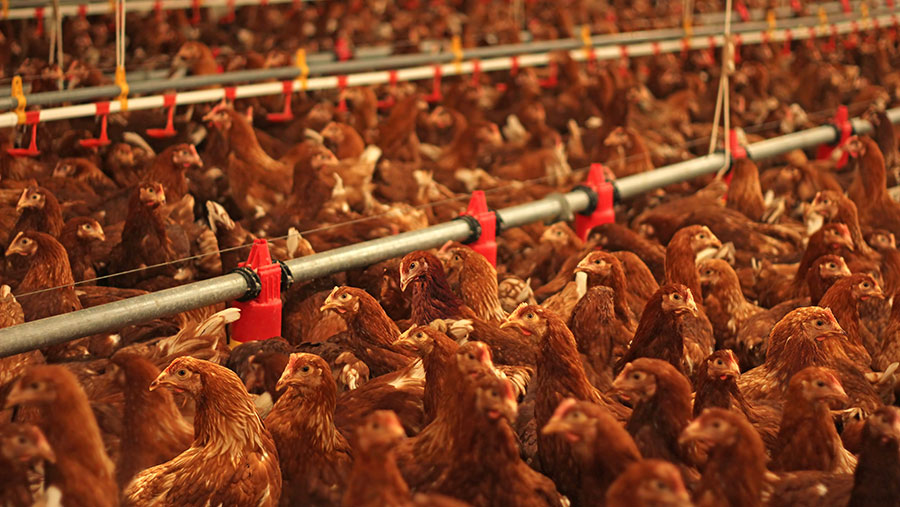New bird housing order to be imposed in East Anglia
 © Branex/Adobe Stock
© Branex/Adobe Stock Free-range poultrykeepers and those with backyard flocks in most of East Anglia will be required to house or net off their birds from Wednesday morning (12 October), as Defra steps up measures to contain avian influenza.
The decision follows an acceleration in the number of outbreaks of the highly pathogenic H5N1 strain of the disease in commercial flocks and wild birds in recent days, and affects all of Norfolk and Suffolk, and parts of Essex.
See also: One farm’s robust plans to combat the threat
Another 16 cases have been confirmed on farms in those three counties in the past week, bringing the total to 30 since the start of September.
Further cases were also confirmed near Frome in Somerset, Cheddleton in Staffordshire and Burscough in Lancashire.
“We are seeing a growing number of bird flu cases on commercial farms and in backyard birds across Norfolk, Suffolk and Essex, and expect the risk to continue to rise over the coming months as migratory birds return to the UK,” said UK chief veterinary officer Christine Middlemiss.
“Keepers in these hotspots must continue to follow strict biosecurity standards to protect their flocks, and should use the next few days to prepare and move their birds indoors.”
The housing order requires all bird keepers in the region to keep their birds indoors and to follow stringent biosecurity measures to help protect their flocks (see “What the housing measure entails”).
Free-range laying birds will still retain free-range status for their eggs for 16 weeks of forced containment.
Defra has also established an interactive map showing all outbreaks and affected areas, and bird keepers are advised to read the new government declaration which sets out the requirements more fully.
What the housing measure entails
The housing measure means bird keepers in the affected area must:
- House or net off all poultry
- Cleanse and disinfect clothing, footwear, equipment and vehicles before and after contact with poultry (if practical, use disposable protective clothing)
- Reduce the movement of people, vehicles or equipment to and from areas where poultry are kept
- Minimise contamination from manure, slurry and other products, and use effective vermin control
- Keep records of mortality, movement of poultry and poultry products, and any changes in production
- Thoroughly cleanse and disinfect housing on a continuous basis
- Keep fresh disinfectant at the right concentration at all farm and poultry housing entry and exit points
- Minimise direct and indirect contact between poultry and wild birds, including making sure all feed and water is not accessible to wild birds
- Prevent access by poultry to ponds and watercourses.
Over the past year, the UK has faced its largest ever outbreak of avian influenza, with more than 160 cases confirmed since late October 2021, including a notable cluster in the South West.
As well as the new housing measure in Norfolk, Suffolk and parts of Essex, a regional avian influenza prevention zone (AIPZ) remains in force in Cornwall, Devon, Isles of Scilly and parts of Somerset, meaning bird keepers in those areas must also step up their biosecurity.
The need to introduce mandatory housing measures as part of the AIPZ in the South West will be kept under regular review.
What to do if you suspect an outbreak
Avian influenza is a notifiable animal disease that can cause a sudden and rapid increase in the number of birds found dead. Other symptoms include a swollen head, watery eyes, lethargy, loss of balance, tremoring, head twisting and/or discolouration of comb and wattles.
Decrease feed and water consumption, respiratory distress, watery droppings and a marked reduction in egg production are other signs.
Any producer who suspects the disease in their poultry is required by law to report it.
- In England, call Defra Rural Services Helpline 03000 200 301
- In Wales, call 0300 303 8268
- In Scotland, contact the local field services office
- In Northern Ireland, call 0300 200 7840
